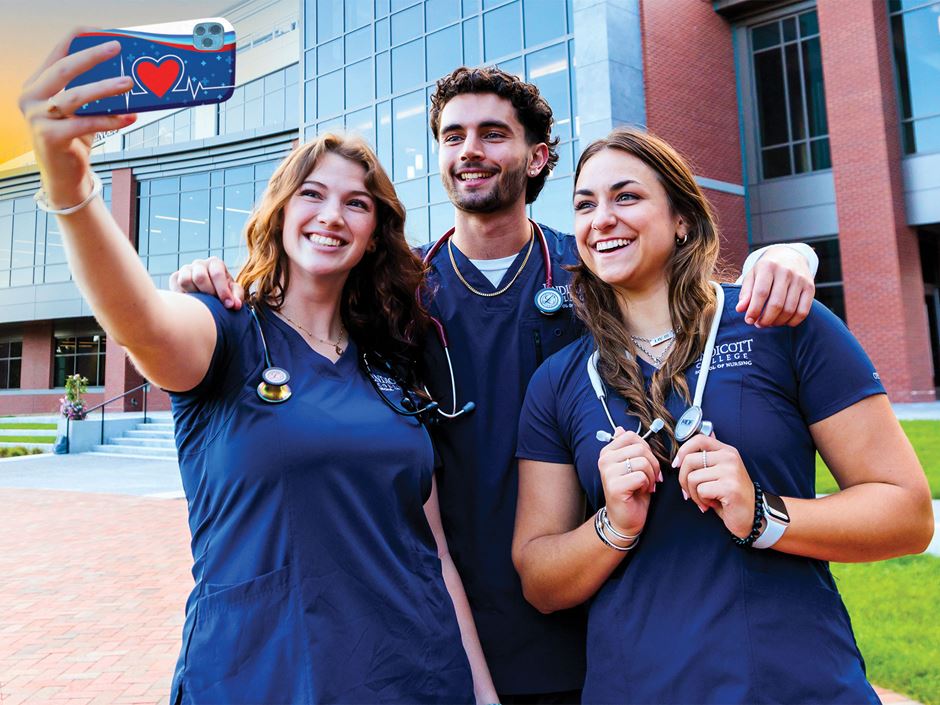When Hannah French graduated from Endicott in 2021 with a bachelor’s degree in nursing, the COVID-19 pandemic was at a new peak thanks to the Delta variant. Despite an overwhelming, learn-as-you-go start that featured some tough lessons, she’s incredibly happy with her career choice.
“It’s true that it’s a very hard time to work in healthcare, but it doesn’t make me not want to do the job I do today,” she shared. “I feel like it’s my purpose to help people.”
French is the kind of person you’d expect to see in nursing—perseverant, motivated, and caring, and inspired by personal experiences with her ailing great-grandmother to help others. She works now at Boston’s Brigham and Women’s Hospital in a job she loves, where she cares for acute patients struggling with heart issues in the cardiovascular step-down unit. She is also pursuing a nurse practitioner master’s at Endicott.
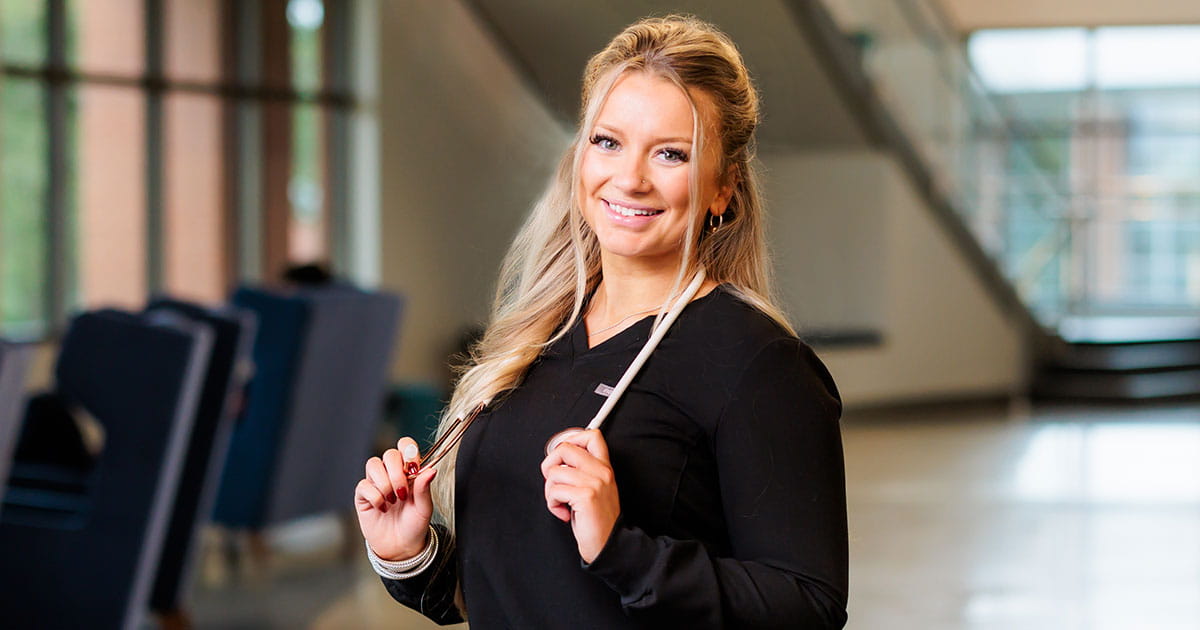
Like French, many nurses are thankful to be in a meaningful profession that brings them fulfillment—the challenge for hospitals and educators today is to help them stay there.
The hard-to-break staffing cycle
According to Dr. Amy Smith, Dean of the Cummings School of Nursing & Health Sciences, one of the biggest concerns in the profession right now—a national staffing shortage of nurses—was already becoming a problem before the pandemic. Many nurses, especially those later in their careers, have made the decision to retire or change professions since COVID-19 hit, exacerbating the issue.
Jared Restivo ’11, Trauma Manager at Beverly and Addison Gilbert Hospitals, said he has seen a massive change in nursing staff over the last three years in his role. And one of the most difficult parts of a shortage of nurses is something people outside the profession might not think of.
“In addition to burnout, there is an overall loss of experience and clinical knowledge across nursing in healthcare nationally,” he explained. “When novice nurses are training new nurses, there are more opportunities for mistakes and fallouts.”
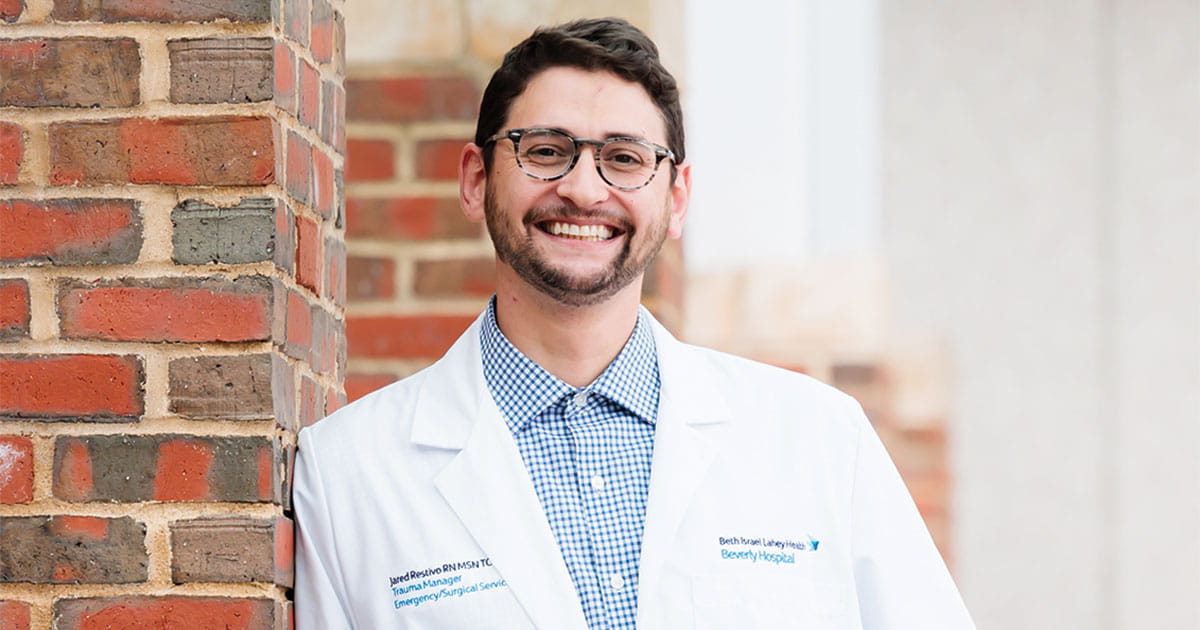
According to Smith, the staffing shortage creates a cycle that’s hard to break.
“High patient-to-nurse ratios and higher patient acuity increase nurses’ stress at work,” she explained. “Nurses make the difficult decision to step away from bedside nursing, which exacerbates the shortage. New graduates are coming on board to help, but the hospitals need to onboard these new nurses, which requires resources from experienced nurses on the floors.”
Jenny Donovan, MSN, RN, is the Director of Simulation and Labs at Endicott and also works part-time as a practicing nurse. She said she gets a call every day asking if she wants to pick up a shift.
“We’re at a staffing shortage, not just with nurses, but administrative assistants, nursing assistants … you just feel it everywhere,” Donovan shared. “You’re looking at someone who’s having the worst day of their lives and you want to help them, but you’re being pulled in a million different directions. We just don’t have the resources we used to.”
The answer? In short, more deliberate nursing education that helps create graduates who are resilient and ready to thrive, raising retention rates.
Innovative learning in a new building
It’s been an exciting year for nursing at Endicott College. In the spring of 2023, Smith was appointed dean of the newly-named Cummings School of Nursing & Health Sciences, and this fall, the College officially dedicated the opening of a brand-new building of the same name. Bringing together classrooms, lab spaces, offices, meeting space, and lounge areas for both the School of Nursing & Health Science and the School of Sport Science programs, the building helps complete Endicott’s vision for a central quad on campus.
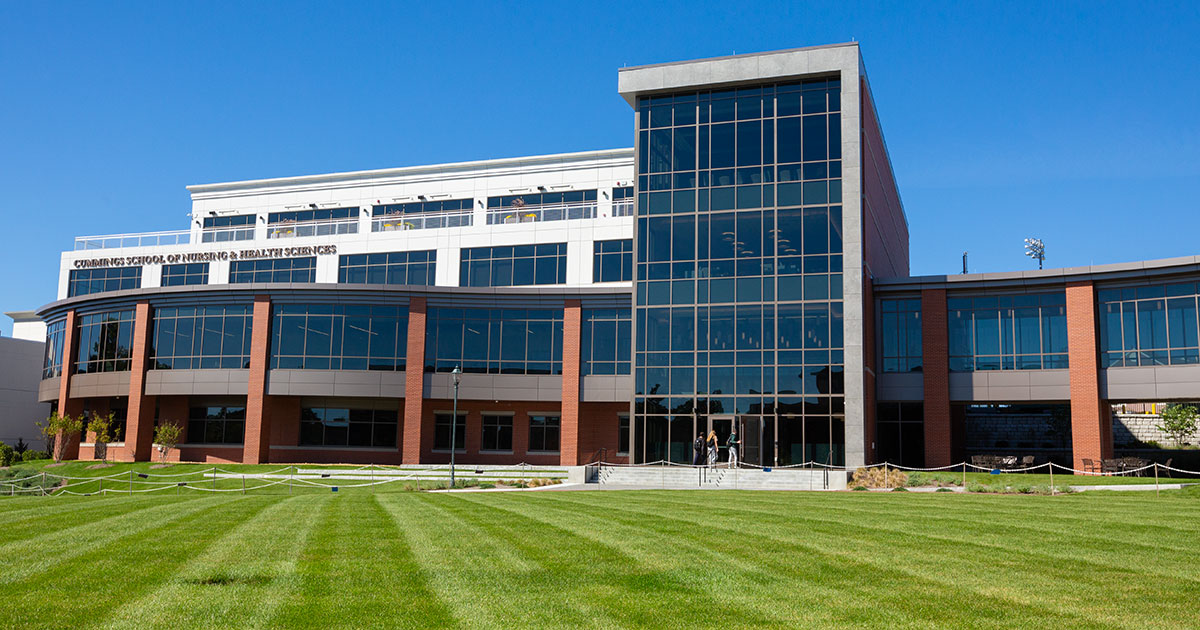
The centerpiece of the lab space for the nursing program is what has been dubbed Endicott Hospital—a collection of rooms that provide space for students to learn on the most current healthcare technology in a highly interactive approach. Two large fundamental rooms are flex spaces, each featuring 12 hospital beds around the perimeter and decentralized seating in the middle—creating a space for students to learn concepts and immediately put them into action.
Additionally, four high-fidelity simulation spaces represent patient rooms with focuses like medical-surgical, pediatrics, labor and delivery, and acute care. The area also includes five exam rooms as you might see in a primary care office, as well as a med room, which mimics a hospital’s supply and medication dispensary for more realistic care scenarios.
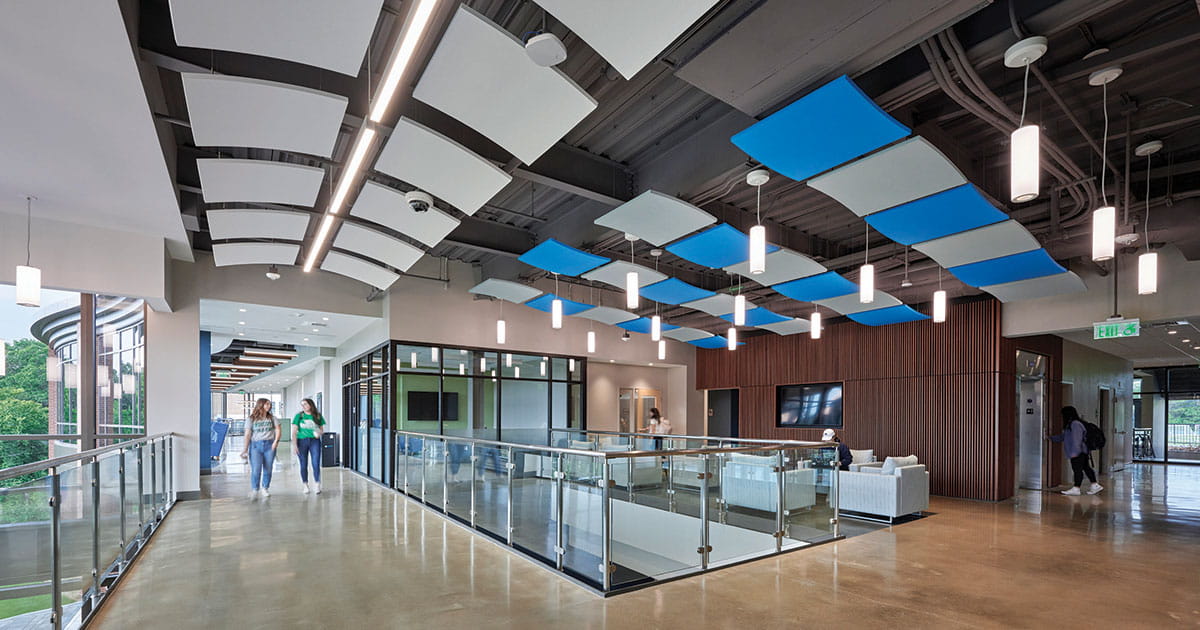
Smith shared that the new spaces distinguish Endicott as a premier nursing program and provide a professional, beautiful building that will attract students.
“This building allows us to elevate everything that we do; we have greater opportunities to be innovative and active in our classrooms,” she said. “We’ll be able to positively impact the level of job readiness of our graduate nurses because they will have additional experiences at Endicott Hospital where they will practice and develop their skills and knowledge.”
The Endicott edge
Nursing students at Endicott have access to more than state-of-the-art facilities as Gulls. Smith’s team of student-centered faculty and staff are known for their inspiration, knowledge, and supportive relationships that extend far beyond graduation.
French said her relationships with faculty helped give her motivation outside of the clinical setting.
“We had such upbeat, intelligent instructors, which helps because you want someone who wants you to learn, who wants you to succeed, and who can relate to you,” she shared.
Those connections extend beyond faculty, too. Restivo recalls intimate classes where classmates and professors knew each other well.
“Since graduating, my classmates have remained very close, and networking still remains tight,” he said. “For example, a nursing student in the class below me was recently hired as a Trauma Program Manager at another Massachusetts hospital, and we have spoken multiple times passing information back and forth.”
Endicott also provides remarkable clinical experiences through partnerships with a variety of local hospitals, from large organizations in Boston to smaller community hospitals.
“We’re very intentional to make sure students have clinical experiences at both community hospitals and the large Boston tertiary care hospitals,” said Smith. “We know retention is a significant problem right now in nursing, so it’s important that students have these experiences and know what type of practice setting they feel most comfortable in.”
Smith added that Endicott’s students have been able to maintain in-person preceptorships despite a reduction of such opportunities due to COVID. She explained that beyond the well-nurtured relationships Endicott has maintained with hospitals and facilities, it is also a testament to the quality of Endicott students when they are in the workplace.
Expanding learning opportunities even more is the development of a study-abroad program with Endicott’s partner institution in Cork, Ireland. Smith is looking forward to cementing the details of the program to give Gulls more global experiences and exposure to healthcare settings in another country.
Teaching clinical judgement
Now that the new building has elevated Endicott’s nursing education offerings, the focus turns to helping the nurses of tomorrow flourish through new teaching methods.
“Critical thinking is the buzzword in nursing school these days,” explained Donovan.
As the person outfitting and planning the features of the College’s new simulation classrooms, Donovan is very familiar with the benefits of the hands-on learning approach that Endicott is famous for. She said one of the objectives is to help students get extremely familiar with fundamental nursing skills like priming an IV line—using the same equipment they’ll encounter at a real hospital—so they build their foundation and can start focusing on the clinical thinking aspects of patient care.
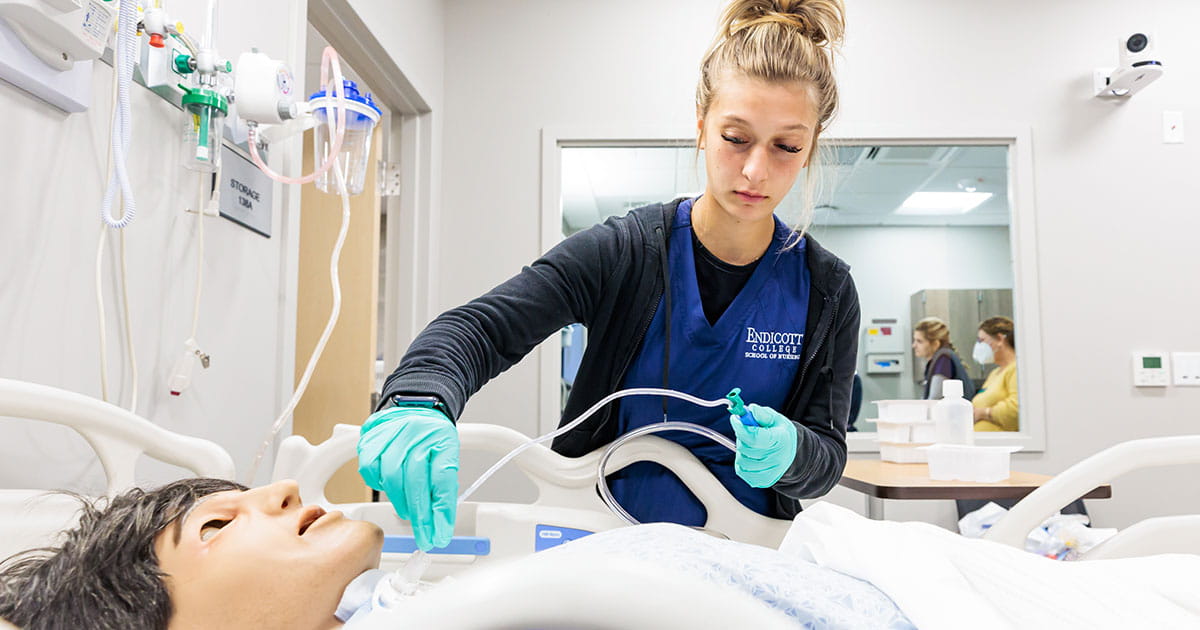
“In your undergraduate program, you’re on a unit with four to six other student nurses and one instructor,” she explained. “It’s great hospital experience, but you have that security blanket of your clinical instructor with you, helping you through that process. When students walk into one of my simulations, they're the primary nurse. It’s their time to make decisions.”
Though critical thinking and clinical judgment have always been taught, they have become more intentional topics of training. It’s even now a much larger part of the NCLEX licensure test that is required of all registered nurses in the U.S. and Canada.
French’s experience in the field proves how important that approach is. She credits the engaging faculty at Endicott with teaching her to think critically and make decisions in a hospital setting.
“As a nurse, we are the eyes, ears, and voice for our patients. The nurses are the ones providing the direct care,” she shared. “You need to have the ability to question things that don’t look right, to gather the right people. Each patient is different, so you have to coordinate your care with the physicians and collaborate with everyone because it takes a village to make it appropriate for that individual person.”
Meeting demand and boosting retention
The hiring demand for nurses is extreme, and Endicott students are finding themselves at the center of all the action. Earlier this year, Brigham and Women’s Hospital came to campus with several nurse managers who set up speed interviewing sessions with current students and offered them jobs on the spot.
As a leading nursing educator, the Cummings School of Nursing & Health Sciences has a role in helping bolster the understaffed nursing profession. Though the ultimate outcome is a big-picture improvement in the number of healthcare workers, the more immediate and personal result is that Endicott graduates find job placements that are fulfilling and long-lasting.
Endicott’s newly launched Project Nightingale is a testament to the work the College is putting into this effort. Its accelerated BSN program is targeted largely to second-career individuals who are drawn to a profession with guaranteed job openings, and the steps Endicott is taking to increase nursing educators will contribute to the number of nurses that can be trained each year.
“Healthcare is in need of nurses, and our graduates are fortunate to be positioned for employment upon graduation. This is really wonderful for them,” Smith said. “Our goal becomes retention—helping our students find jobs they’ll love and are prepared for, and giving them the tools to be resilient and successful to truly make a difference in their patients’ and their families’ lives.”
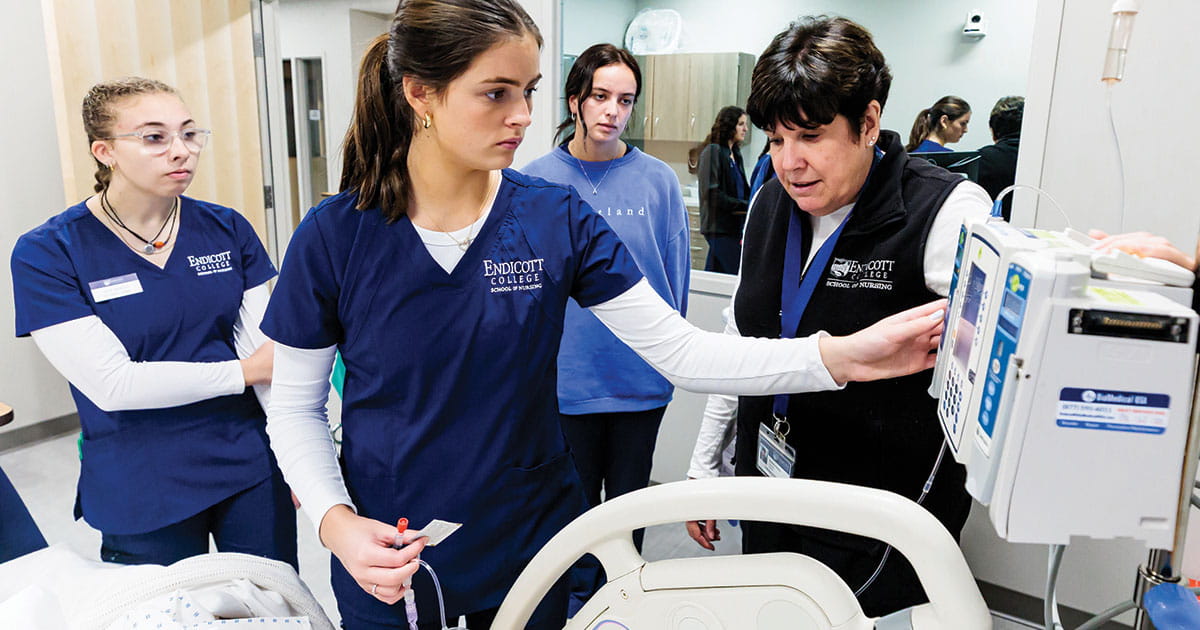
Stefano Mitsakis ’22, BSN, who works at Melrose Wakefield Hospital, said that Endicott’s preparation helped him get a job he feels very satisfied in.
“I love the staff I work with, everyone is always working as a team,” he said. “The field is extremely demanding, and finding a place where you feel welcomed is important.”
Creating innovative pathways to increase retention of working nurses is now one of Smith’s priorities.
“I want to help our graduates remember what brought them into nursing in the first place so they can make it through difficult times,” she said.
For students like French and Mitsakis, Endicott is the reason they’re working in a field they love. And that, at the end of the day, is what higher education is all about.
A New Home for Sport Science
The new Cummings School of Nursing & Health Sciences offers 69,000 square feet of state-of-the-art spaces for sport science and nursing programs, along with perks like a rooftop event terrace.
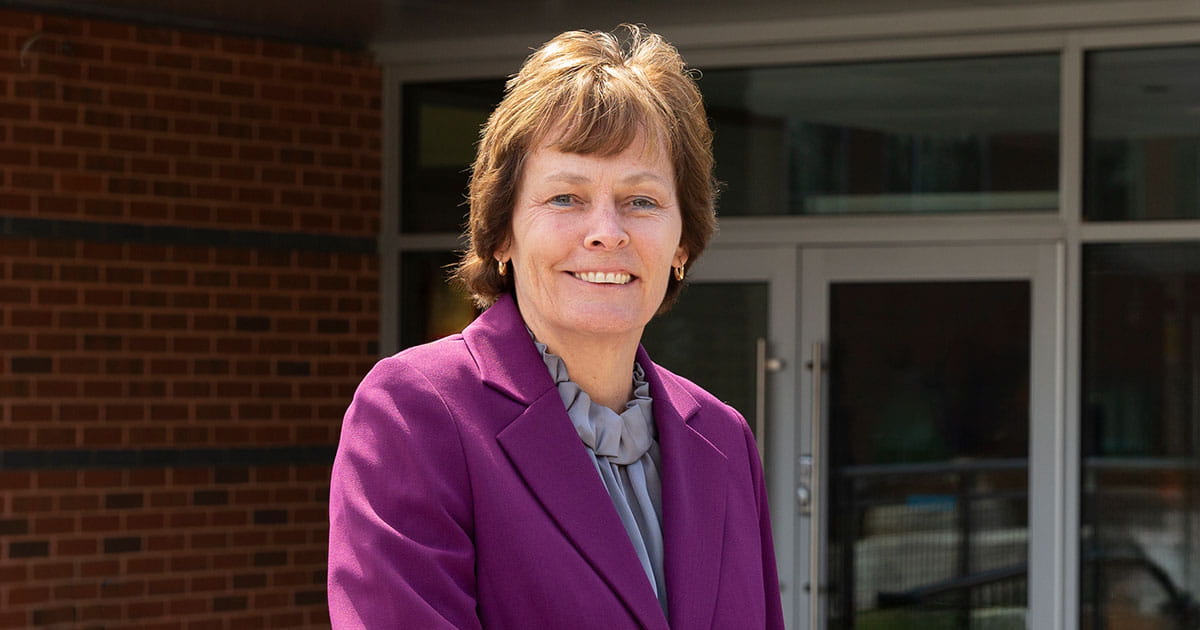
According to Dean of Sport Science Deborah Swanton, athletic training and exercise science students will build and strengthen their clinical skills in three state-of-the-art laboratory spaces, including the human performance lab, therapeutic lab, and modalities lab with a hydrotherapy room.
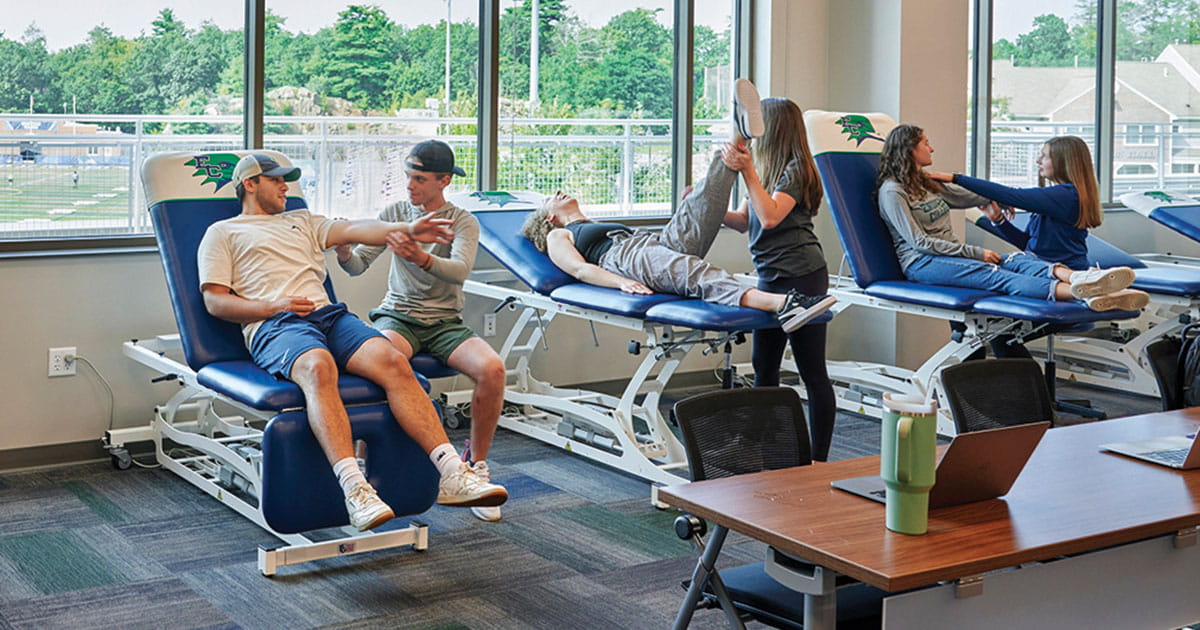
Students in sport management and esports management will hone their entrepreneurial skills and engage in learning about the intricacies of the global and expanding sports and esports industries in boardroom-style learning spaces with the most updated technology.
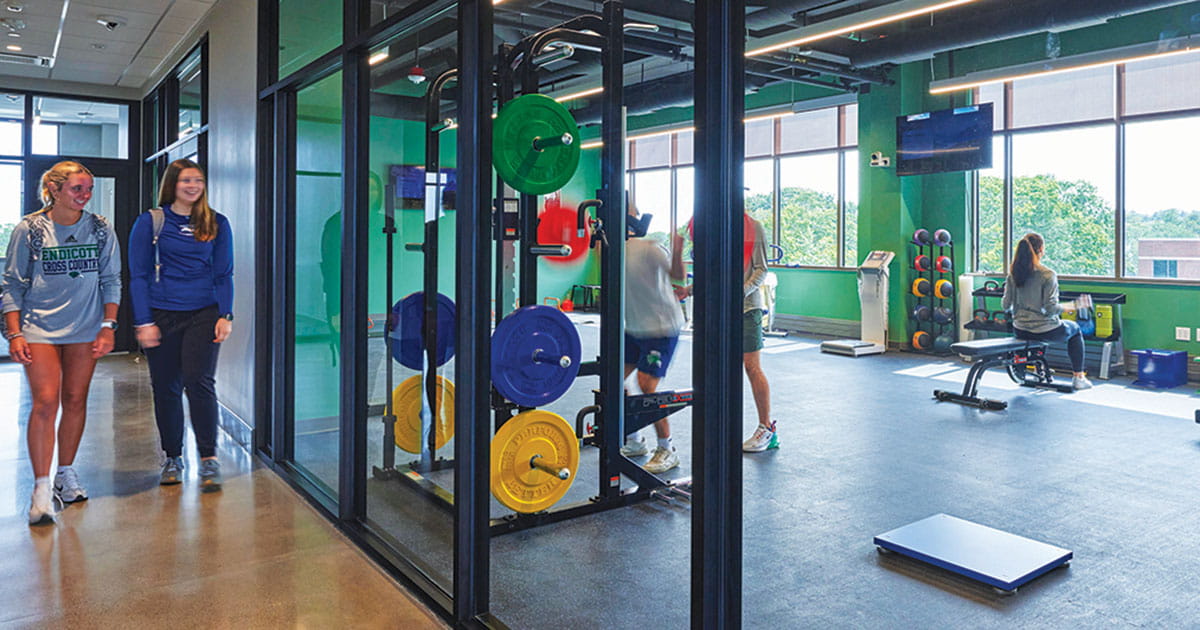
“The building includes many areas for students to study and engage in group work,” Swanton said. “What is most exciting is that academic programs are now located together in the heart of the campus. We look forward to collaborating with faculty and staff across disciplines to create opportunities for all students.”
New Student-Focused Leadership
Cummings School of Nursing & Health Sciences Dean Amy Smith came to Endicott in 2019 after many years at Boston College. A faculty member who was quickly elevated to Associate Dean, Smith stepped into the Dean role earlier this year.
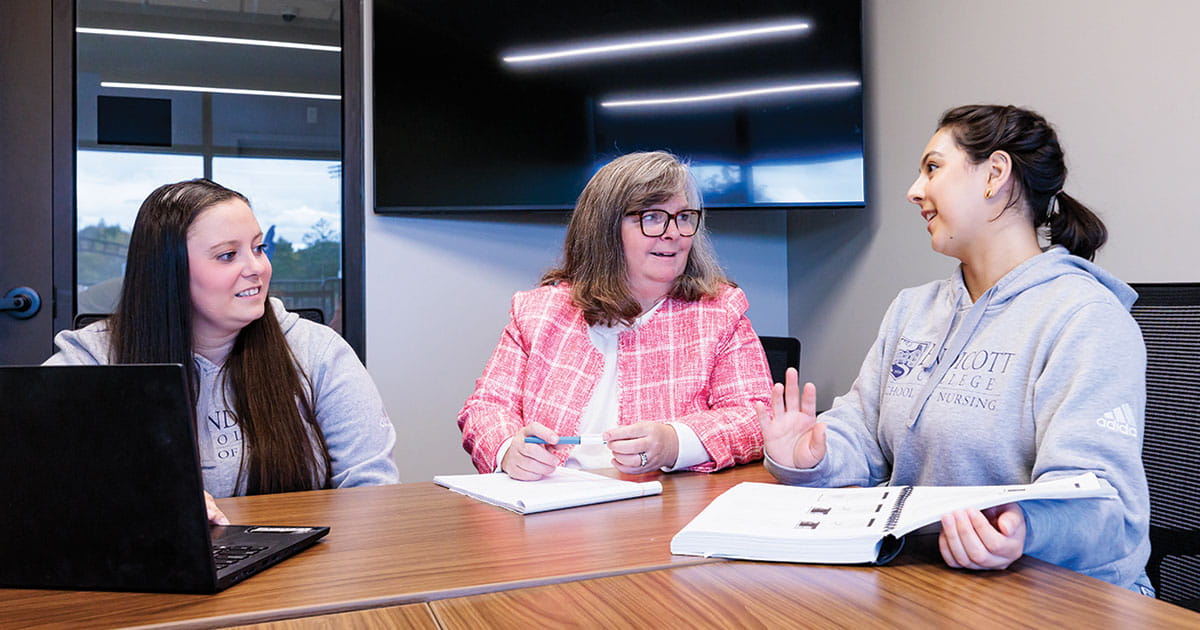
She is already known for a very student-centered approach to leadership.
“I will bend over backward and then some for students—that’s why we’re here,” she said. “I want them to feel supported holistically and I think that’s infused in everything we do.”
Provost and Director of Endicott Scholars Sara Quay, Ph.D., said Smith “brings intelligence, compassion, and intentional decision-making to her role as Dean.”
Smith’s goal is to be thoughtful about creating a well-done product that elevates the nursing program and highlights the quality of our faculty.
“We’ve got an amazing group of talented, hardworking, and fantastic faculty. I’m truly honored to be a part of that team,” she said.
